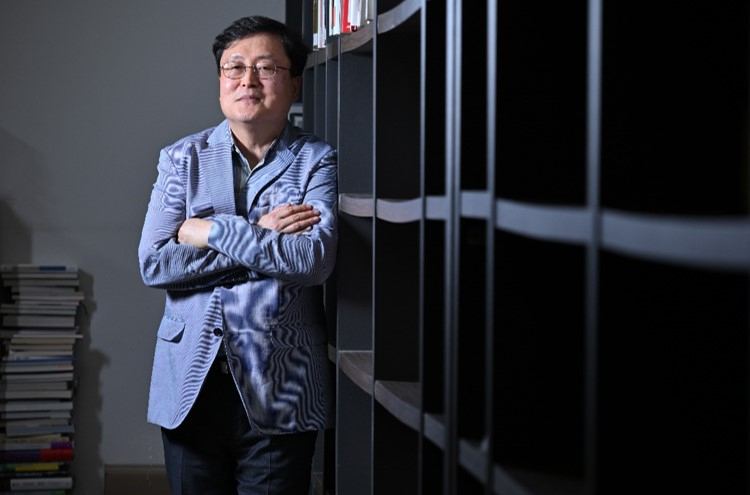 |
Kang Yong-soo, the author of the book titled "Reading Schopenhauer at Forty," poses for a photograph at the headquarters of Herald Media Group in Seoul. (Im Se-jun/The Korea Herald) |
“A man can be himself only so long as he is alone; and if he does not love solitude, he will not love freedom; for it is only when he is alone that he is really free."
“What now on the other hand makes people sociable is their incapacity to endure solitude and thus themselves."
More than ever before, the wisdom of Arthur Schopenhauer (1788-1860), a German philosopher, resonates with contemporary South Koreans who seek relief from relationship fatigue, social expectations and external validation.
“Schopenhauer tells us that people often fail to productively utilize their solitary time due to incapacity, inner emptiness and boredom,” said Kang Yong-soo, a researcher at the Institute of Philosophical Studies at Korea University and the author of the book, “Reading Schopenhauer at Forty.”
“In such cases, socializing with others is a cowardly way of avoiding confrontation with one’s own solitude.”
“Reading Schopenhauer,” a Korean-language introduction to the thinker’s teachings on the virtues of solitude and self-reliance for personal growth and well-being, became a bestseller this year following recommendations from several celebrities, including K-pop girl group member Jang Won-young.
The book currently sits atop the bestseller list this year at Kyobo Book Centre, the nation's largest bookstore.
The author, in an interview with The Korea Herald, said there are two types of solitude.
An involuntary solitude is when a person avoids others because they are hurt, or afraid of getting hurt, by them. A voluntary solitude, on the other hand, is when one chooses to be alone to understand themselves and reflect on their identity.
"The latter is deemed healthy solitude,” Kang said. “The only thing we can truly rely on in this world is ourselves. We can be happiest when we fully trust in ourselves,” he continued.
Kang, who earned his doctoral degree at Julius-Maximilians-Universitat Wurzburg in Germany, said that many Koreans try to fill their voids through relationships, which sometimes causes emotional pain. “To be happy, individuals need to find a balance between standing alone and being with others.”
Schopenhauer’s philosophy underscores the importance of individuality and pursuing meaningful endeavors, a mindset that contrasts with the traditional Korean focus on winning the recognition of others through ostensible achievements such as gaining a good job or wealth.
In Korea, the importance of external evaluation starts from a young age, affecting one’s choices in schools, majors, jobs and partners to prioritize social acceptance and perceptions rather than personal desires, according to Kang.
“So they may never truly know what they want until they die.”
The author first encountered Schopenhauer in his 20s, when his life was full of uncertainties regarding money, relationships, love and his future career path. He found solace in Schopenhauer’s comparison of life to an uncertain and painful voyage.
The book’s title, specifically referencing age 40, reflects Schopenhauer’s belief that the 40s are a significant period in a person’s life. It is a time when people, having accumulated knowledge and experience in their 20s and 30s, begin to stabilize and reflect on their lives.
“To understand this world, one needs not only rich experiences but also a variety of perspectives and viewpoints,” he said. “It takes at least 40 years of maturity to judge, understand and nurture phenomena. Youth may lack wisdom but possess more courage.”
Kang concludes that after experiencing life's bitterness during turbulent times, one's perspective broadens and deepens. “If you want to lead a happy life after 40, you must accumulate experiences and knowledge and repeatedly engage in self-reflection.”




![[Herald Interview] How Gopizza got big in India](http://res.heraldm.com/phpwas/restmb_idxmake.php?idx=644&simg=/content/image/2024/11/20/20241120050057_0.jpg)


![[KH Explains] Dissecting Hyundai Motor's lobbying in US](http://res.heraldm.com/phpwas/restmb_idxmake.php?idx=644&simg=/content/image/2024/11/20/20241120050034_0.jpg)